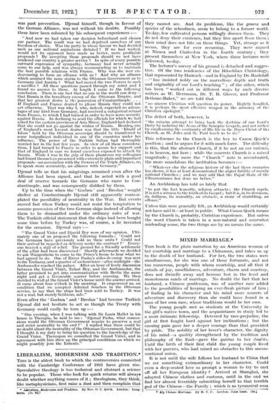LIBERALISM, MODERNISM AND TRADITION.* This is the ablest book to
which the controversies connected with the Cambridge Conference of 1921 have given rise. Speculative theology is too. technical and abstract a science to be popular. Those who look for quick returns will always doubt whether anything comes of it ; theologians, they think, like metaphysicians, first raise a dust and then complain that • Liberalism, Modernism and Tradition. By Rev. 0. C. Quick. London : Long- maw. L74. 6d .I they cannot see. And its problems, like the genera and species of the schoolmen, seem to belong to a former world. To-day, few cultivated persons willingly discuss them. They do not deny their existence, but they live apart from them ; their mind does not bite on these things. Yet, strange as it seems, they are for ever recurring. They were argued at Nicaea and Chalcedon in the fourth century ; they present themselves at New York, where these lectures were delivered, to-day.
The lecturer's survey of his ground is detached and sugges- tive. Of the two tendencies of the Ritschlian Christology, that represented by Hamaek—and in England by Dr. Rashdall —" has insisted nobly on the marvellous depth and truth and originality of our Lord's teaching " ; of the other, which has been " worked out in different ways by such diverse writers as W. Herrmann, Dr. T. R. Glover, and Professor Bethune-Baker," we are told that
" no sincere Christian will question its power. Rightly handled, it is perhaps the most effective weapon in the armoury of the Christian apologist."
The defect of both, however, is
"the ruinous attempt to bring back the doctrine of our Lord's Deity by isolating the Jesus of the Synoptic Gospels, and not rather by emphasizing the continuity of His life in the Risen Christ of the Church, as St. Joha and St. Paul teach us to do."
This reference to the Church is the key to Canon Quick's position ; and he argues for it with much force. The difficulty is this, that the abstract Church, if it be not an ens rationis, is in heaven, not here ; while the concrete Church is a mixed magnitude ; the more the " Church " note is. accentuated, the more scandalous the institution becomes :- " Whatever else the religious history of the last three centuries has shown, it has at least demonstrated the abject futility of merely national Churches ; and we may add that the Papal State of the Ultramontanes has done no better."
An Archbishop has told us lately that
"to put the fact honestly, religion attracts ; the Church repels. It is not a witness to the truth of its Gospel ; but it is, in its divisions, its dullness, its unreality, an obstacle, a stone of stumbling, atm offence."
Unless this were generally felt, an Archbishop would certainly not have said it—at least in public. What Canon Quick means by the Church is, probably, Christian experience. But unless the word Church is taken in a non-natural and somewhat misleading sense, the two things arc by no means the same.










































 Previous page
Previous page